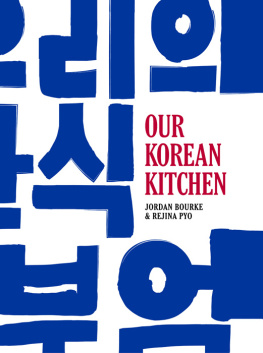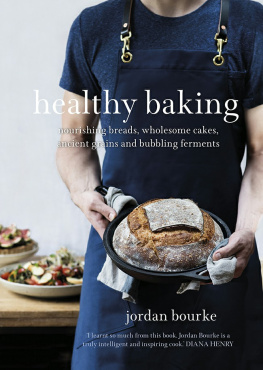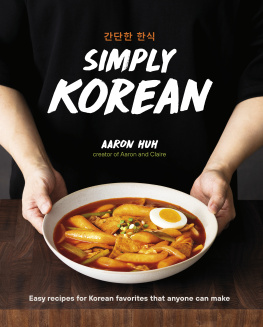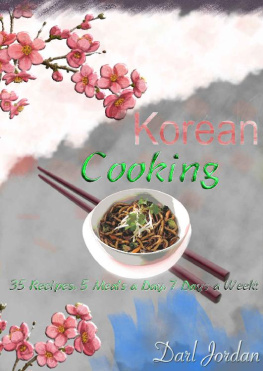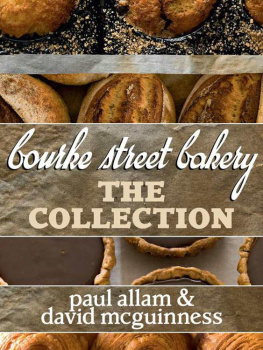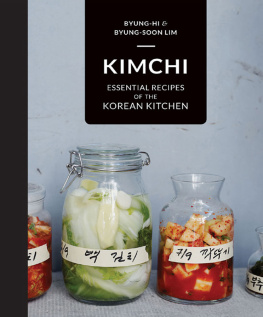Jordan Bourke - Our Korean Kitchen
Here you can read online Jordan Bourke - Our Korean Kitchen full text of the book (entire story) in english for free. Download pdf and epub, get meaning, cover and reviews about this ebook. year: 2017, genre: Home and family. Description of the work, (preface) as well as reviews are available. Best literature library LitArk.com created for fans of good reading and offers a wide selection of genres:
Romance novel
Science fiction
Adventure
Detective
Science
History
Home and family
Prose
Art
Politics
Computer
Non-fiction
Religion
Business
Children
Humor
Choose a favorite category and find really read worthwhile books. Enjoy immersion in the world of imagination, feel the emotions of the characters or learn something new for yourself, make an fascinating discovery.
- Book:Our Korean Kitchen
- Author:
- Genre:
- Year:2017
- Rating:4 / 5
- Favourites:Add to favourites
- Your mark:
- 80
- 1
- 2
- 3
- 4
- 5
Our Korean Kitchen: summary, description and annotation
We offer to read an annotation, description, summary or preface (depends on what the author of the book "Our Korean Kitchen" wrote himself). If you haven't found the necessary information about the book — write in the comments, we will try to find it.
Our Korean Kitchen — read online for free the complete book (whole text) full work
Below is the text of the book, divided by pages. System saving the place of the last page read, allows you to conveniently read the book "Our Korean Kitchen" online for free, without having to search again every time where you left off. Put a bookmark, and you can go to the page where you finished reading at any time.
Font size:
Interval:
Bookmark:
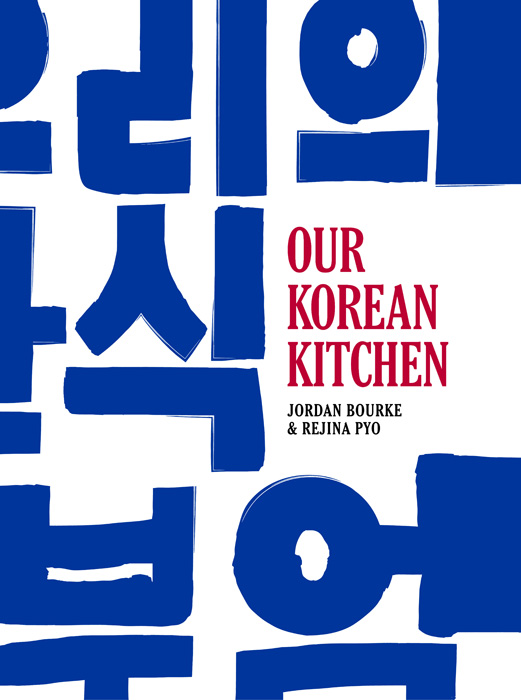
Our
Korean
Kitchen

-
Food is at its most delicious when shared
Jordan Bourke & Rejina Pyo
Photography by Tara Fisher

Enthralling, authentic, and beautifully written I havent been so excited by a cookbook in a very long time.
Skye Gyngell


Our Korean kitchen is an unusual one: a kitchen found not in Korea, but in London, and with only one true Korean at the helm, my wife Jina, a fashion designer in her own right but equally passionate about the food of her birthplace. And then alongside her is me, an Irish chef, who somehow found himself besotted with not only the girl from Korea, but also the food and culture of a nation so far away from my own.
While I am still passionate about the classical and Mediterranean food of my upbringing, training, and indeed my daily work as a chef, it is fair to say that the allure of Jinas Korean home cooking and the food of her country has been so great that it has, in less than a decade, gained equal footing in my world of food. It has brought us not only together, but on many exciting and extended pilgrimages throughout Korea Jina retracing her roots, the food of her childhood, and a life lived there until her mid-twenties, and I, working in restaurants and learning from chefs and culinary masters of this beautiful and fiery cuisine, the most important teachers being Jinas mother and father.
Years ago, when Jina first introduced me to proper Korean food, I was astonished that I had known so little of it prior to meeting her. I couldnt understand how a food and culture this wonderful could have remained relatively unknown to the rest of the world in comparison with its close neighboring countries, China and Japan, whose traditional dishes are famous and familiar to us all. Jina too was in astonishment but for another reason in her first year of living in London, having longed for a taste of proper Western food, she suddenly realized how lucky she had been growing up in a culture where such affordable, healthy, and great-tasting food was available everywhere, from schools and hospitals to street-food stalls, corner stores, and of course at home.
Good food and cooking is so ingrained in Korean culture and everyday life that even the standard Korean greeting is grounded in food. Korean people dont ask how you are, but, bab mogosoyeo? which translates as, have you eaten? or literally, have you eaten rice? The idea being that how you are entirely depends on how well nourished you are, so they might as well get straight to the point.
Back in London, with a fridge full of various fermented chili pastes, homemade kimchi, and pickled vegetables, we keep this wonderful country and cuisine alive in our own Korean kitchen, fifty-five hundred miles away from its birthplace. We do this in part out of nostalgia for the food we have eaten there, but mainly we do it because we adore great food, and the food of Korea is quite simply some of the best we have ever encountered, anywhere.
Fortunately, in the years that have passed since Jina first cooked Korean food for me, it has exploded onto the world stage, with food trucks and restaurants popping up all over the place and Korean produce becoming increasingly easy to find. The word is out, and it could not be more positive. People are enthralled by the robust, complex, and subtle flavors of this countrys food, and what was for many years the secret Asian cuisine is now fast becoming the most popular Asian food of all.
This book is somewhat of a shared journey through the most loved and authentic recipes of Korea, dishes that have in some cases been cooked by Korean families in one form or another for centuries, and yet here we are in London cooking a version of those same recipes. While we have made these dishes our own, we were very keen to keep as close as possible to the traditional and authentic ingredients and methods of Korean cooking. This is particularly important now, as up to this point there has been relatively little written about the food and cooking of Korea, so we feel an extra onus has been placed upon us to get it right. We want to honor the truly exceptional food of Jinas home country, her family, and indeed the many great chefs and masters of Korean food from whom we have had the great privilege of learning. You can of course tweak the recipes if you like, swapping one vegetable for another, or lowering the quantity of chili paste to suit your palate, but at the very least we wanted you to have as authentic and traditional a starting point as possible.
What is fascinating about Korean cuisine is the sheer quantity, literally hundreds, of national dishes, each one being unique to the country, and within that there are numerous regional varieties. This is even more impressive when you consider Koreas difficult past. Although hard to imagine when you visit the historic but ultra-modern and sophisticated city of Seoul today, over its history Korea has regularly been levelled, rebuilt, and then obliterated once again by its expansionist neighbors, China and Japan. Even as recently as the 1950s, Korea remained a war-torn and poverty-stricken land, as the communist north and the capitalist south fought for control in the civil war.
The result of which is the present-day North and South Korea two countries which now share little more than a border and a similar name the south having leapfrogged in a matter of only a few decades from a decimated post-war country to one of the wealthiest nations in the world, with a capital city so cosmopolitan and fast-paced it would make New York look parochial.
Despite all this historical jostling and extended periods of occupation, Korean cuisine remains distinct from that of its neighbors with a range of differing cooking techniques. The most noticeable of which are the preservation and fermentation techniques they employ, giving their food a unique combination of flavors. Perhaps because of their past, Koreans are incredibly passionate about their national dishes and have very strong views on how certain foods should taste and be presented. Even the slightest departure from the norm can cause disturbances with heated debates ensuing both sides declaring their way of cooking said dish to be the best.
However, if you then ask to be guided through their version of a recipe, it all becomes rather vague, a little bit of this, a little bit of that. This is largely because Koreans are natural and instinctive cooks, using recipes passed down from generation to generation. They cook intuitively, according to a clear set of flavor profiles that they have been brought up with. Asking them to provide you with precise measurements is pointless you just have to watch and learn, slowly building up your palate to match theirs.
Of course, not everyone has a brilliant Korean cook on standby to watch and learn from. In light of this, we hope that this book will be a good alternative, guiding you through the traditions and staples of authentic Korean home cooking.


Font size:
Interval:
Bookmark:
Similar books «Our Korean Kitchen»
Look at similar books to Our Korean Kitchen. We have selected literature similar in name and meaning in the hope of providing readers with more options to find new, interesting, not yet read works.
Discussion, reviews of the book Our Korean Kitchen and just readers' own opinions. Leave your comments, write what you think about the work, its meaning or the main characters. Specify what exactly you liked and what you didn't like, and why you think so.

